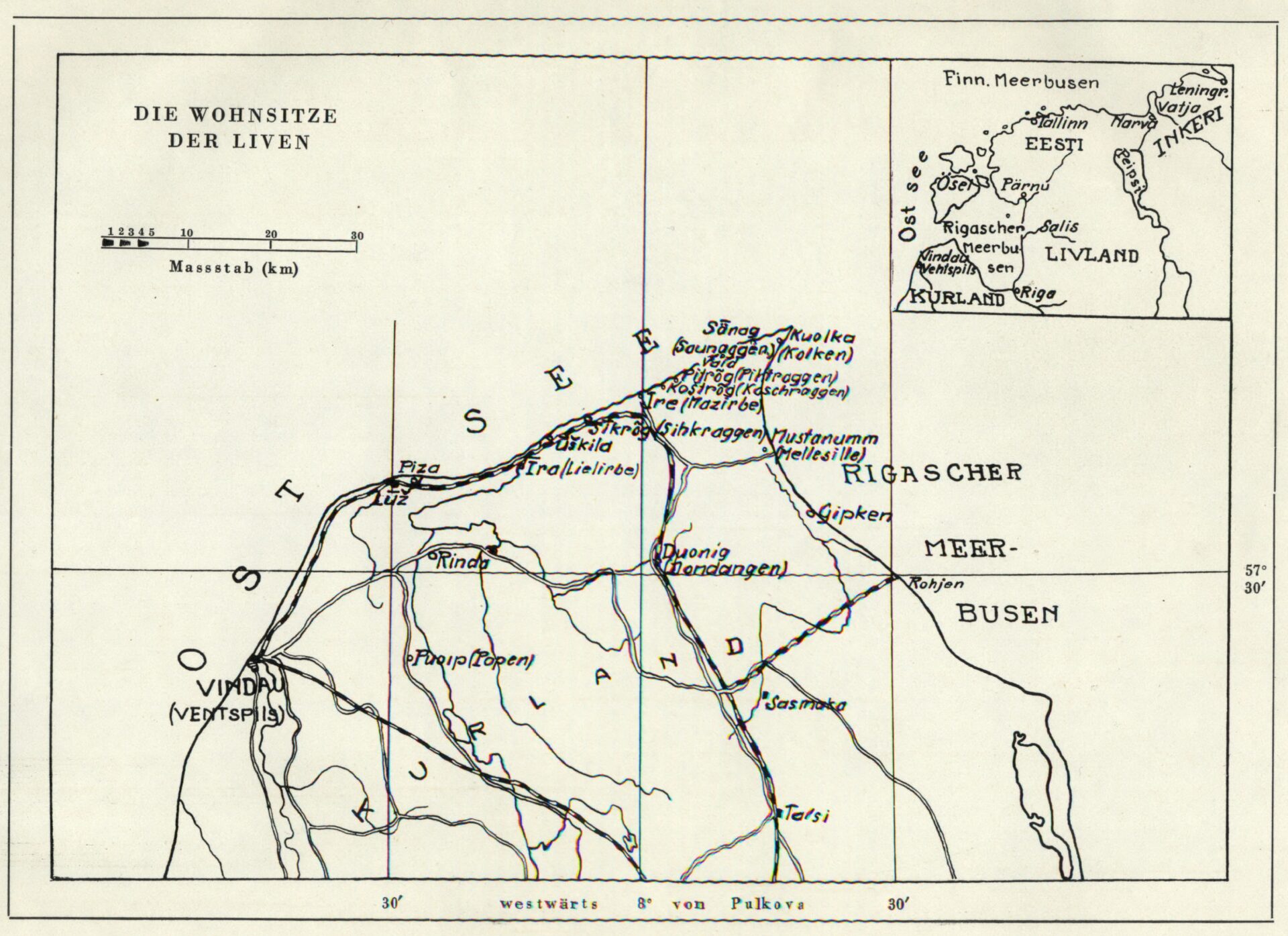
Livonian
3.2. Gramatik / Grammar
This grammar section gives an overview of the Livonian noun case system. Page 1 presents the productive cases, page 2 the unproductive cases, and page 3 the nominative and genitive forms.
Productive noun cases
In Livonian, nouns, adjectives, numerals, and pronouns change in both case and number. There are eight productive cases (see the tables below). These include, for example, the dative, which is used to indicate the recipient and also the possessor (in Estonian, the external locative cases are used for this), e.g., Mi’nnõn vȯ’ļ i’bbi ’I had a horse’ (cf. Estonian Minul oli hobune). The dative is also used to indicate the experiencer, e.g.,Tä’mmõn u’m kīlma ’He is cold’. In Livonian, the instrumental case more or less fulfills the functions for which the comitative and translative are used in Estonian, e.g., Pi’ņ nūoliz kīelkõks iļ sū. ’The dog licks its mouth all over with its tongue.’ (cf. Estonian Koer lakkus keelega üle suu.), ei vanāks ‘(it) got older’ (cf. Estonian jäi vanaks).
In general, the choice of case ending depends on the structure of the lexical stem or on changes occurring at the boundary between the stem and the case ending. The main rules for choosing the appropriate case ending are described in the next chapters. As shown in the tables below, kis has unique singular and plural forms, while mis only has singular forms. Although kis generally refers to living or animate referents and mis to ones that are inanimate, generalization also occurs (probably under the influence of Latvian, which has one general interrogative-relative pronoun kas ‘who, what’).
The following tables show the singular and plural case endings for the wordskalā ’fish’, nai ’woman’, pū ’tree, wood’, and ke’ž ’hand’. Weak-grade forms are marked green, strong-grade forms are marked black.
| Noun case | Question word | Case ending | Examples | Examples |
|---|---|---|---|---|
| Nominative | Kis? Mis? | kalā pū | nai ke’ž | |
| Genitive | Kīen? ~ Kīnga? Mis? | kalā pū | naiz kä’d | |
| Dative | Kīen? ~ Kīngan? Missõn? | -õn -n | kalā|n pū|n | naiz|õn kä’dd|õn |
| Partitive | Kīenta? ~ Kīenda? Midā? ~ Mis? | -tā -dā -ţa ta -da -tõ -dõ -t -õ -i | ka’ll|õ pū|dõ | nāiz|ta kä|tā |
| Instrumental | Kīenkõks? ~ Kingaks? Missõks? | -kõks -õks -ks | kalā|ks pū|kõks | naiz|õks kä’d|kõks |
| Illative | Kīenõ? Missõ? | -zõ -õ -õz | ka’ll|õ pū’|zõ | naiz|õ kä’dd|õ |
| Inessive | Kīensõ? Missõs? | -õs -s -sõ -šõ -š | kalā|s pū|sõ | naiz|õs ~ nai|sõ kä’d|sõ |
| Elative | Kīenstõ? Missõst? | -õst -st -stõ -št -štõ | kalā|st pū|stõ | naiz|õst ~ nai|stõ kä’d|stõ |
| Noun case | Question word | Case ending | Examples | Examples |
|---|---|---|---|---|
| Nominative | Kis? ~ Kīend? Mis? | -t -õd -d | kalā|d pū|d | naiz|t kädū|d |
| Genitive | Kīend? Mis? | -t -õd -d | kalā|d pū|d | naiz|t kädū|d |
| Dative | Kīendõn? Missõn? | -ddõn -dõn -tõn | kalā|dõn pū|dõn | naiz|tõn kädū|dõn |
| Partitive | Kīendi? Midā? ~ Mis? | -ţi -ḑi -ti -di -i | ka’ļ|ḑi pū|ḑi | naiž|i ke’žž|i |
| Instrumental | Kīendõks? Missõks? | -dkõks -tkõks -dõks -tõks | kalā|dõks pū|dkõks | naiz|tkõks kädū|dõks |
| Illative | Kīeniž? Missõ? | -ži -īž -iž -ž -īz -iz | ka’ļ|ži pū’|ži | naiž|iz kež|īz |
| Inessive | Kīenši? Missõs? | -ši -īs -is | ka’ļ|ši pū|ši | naiž|is kež|īs |
| Elative | Kīenšti? Missõst? | -šti -īst -ist | ka’ļ|šti pū|šti | naiž|ist kež|īst |


